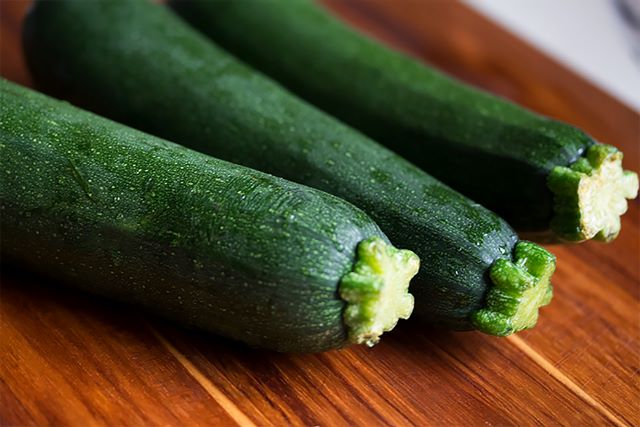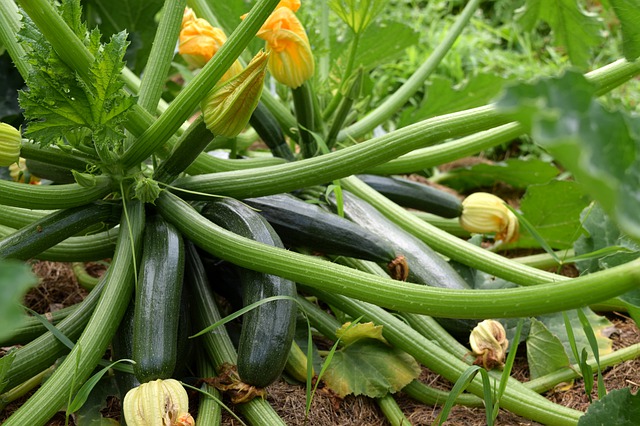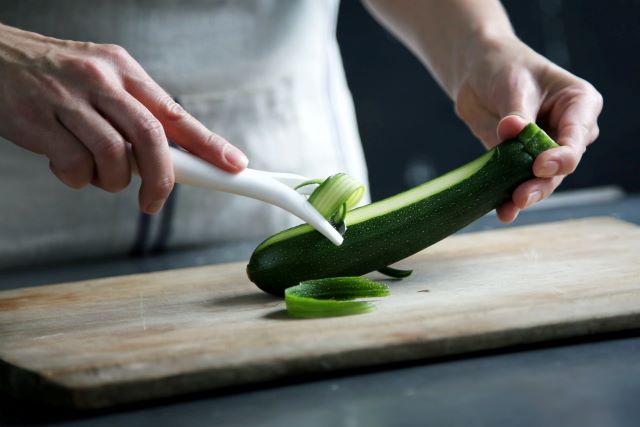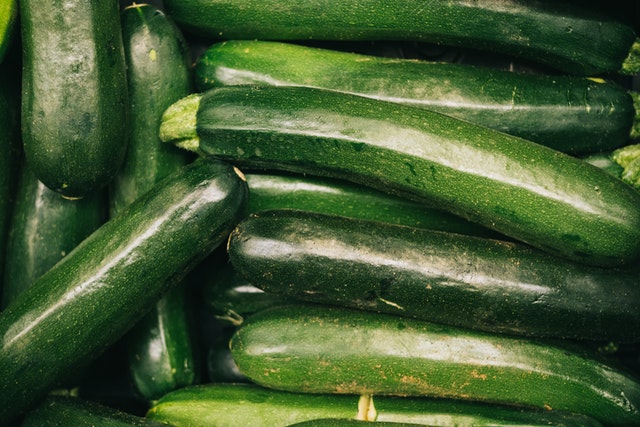Zucchini is a favorite crop among home gardeners of all types and one that I include in my garden every summer. It’s easy to grow and nutritious and makes for a bountiful harvest with little effort. However, sometimes zucchini can taste bitter leaving you with an unpleasant meal you might prefer to discard. So in this article, we find out why zucchini tastes bitter and the steps you can take to fix this problem.

Table of Contents
- Why Is My Zucchini Bitter? — The Short Answer
- Does Zucchini Naturally Have a Bitter Taste?
- The Growing Process Affects the Taste of Zucchini
- Harvesting Late Can Cause Bitter Zucchini
- How Can I Store Zucchini to Prevent Bitterness?
- Can I Still Eat Bitter Zucchini?
- How Can I Take the Bitterness Out of Zucchini?
- Can I Tell if Zucchini Will Be Bitter Before I Purchase It?
Why Is My Zucchini Bitter? — The Short Answer
The most common cause of zucchini tasting bitter is the chemical makeup of the zucchini itself. Zucchinis produce a chemical compound known as cucurbitacins which are influenced by the growing process, harvest time and factors such as storage and preparation.
Does Zucchini Naturally Have a Bitter Taste?
All “vine” type crops, like cucumbers, zucchini, and even melons, produce natural chemicals called cucurbitacins. Cucurbitacins are antioxidants that fight free radicals and are used to treat a variety of ailments.
Most often, these chemicals only exist in small amounts in zucchini and do not affect the taste. However, if they build up inside the zucchini, they can cause it to taste bitter.
If you have a bitter-tasting zucchini, a build-up of cucurbitacin may be the reason. This is one of the most common causes of vegetable bitterness.
The Growing Process Affects the Taste of Zucchini

When cucurbitacins build up in zucchini, you can usually attribute the cause to stress endured by the plant during the growing process. This stress can result from improper care of the zucchini plant or other poor conditions.
If you’re growing bitter zucchini in your garden, make sure to check for the following things.
Zucchini Receives Enough Water
Although zucchini do not need excessive amounts of water to grow, if the weather is dry and hot for a long time during the growing process, cucurbitacins, nitrates, and nitrogen compounds will build up.
Most commercial farmers have plans to avoid this situation, such as proper irrigation systems or covering the planted rows of zucchini with a transparent plastic cover to trap moisture (like a greenhouse).
However, home gardeners may not always effectively mitigate this problem. Taking care to ensure that the soil does not dry out, yet does not get overwatered either, can help grow a less bitter zucchini.
I always ensure I give my zucchini a deep watering when the soil feels dry (watering the soil directly). During the hottest months of the summer, it means that I water at least 2 to 3 times a week. The plan may only require watering once a week during cooler or wetter weather.
Zucchini Has Enough Sunlight
Like tomatoes and many other crops, zucchini requires sufficient sunlight to grow properly. When choosing a spot to plant your zucchini, I suggest considering a location that receives full sunlight.
Look up, down, and around as you plan your plot. Make sure you don’t have any overhead trees blocking the sun, large bushes in the immediate area, or even a fence or wall nearby that will block the sun.
Correct Soil and Fertilizer for Zucchini Plants
Certain soils can contain heavy metals and toxins, which can transfer into the zucchini plant and affect the taste. The soil’s pH level can also affect the quality of your zucchini crop.
Almost all zucchini require a neutral pH level between 5.5 to 7.5 to thrive. Soil that is too alkaline or too acidic will affect the growth and taste. You can purchase an inexpensive pH meter to continuously check your soil levels.
To avoid heavy metals and toxins, I like raised bed gardening. For this, I always use organic soil and prefer one with a built-in fertilizer. I replenish it in the garden beds during late spring/early summer before I plant my new zucchini crop.
Many suitable organic soil/fertilizer mixtures exist on the market, but I always like this organic potting mix. This one feeds my zucchini plants for up to 3 months.
Zucchini Companion Plants
Companion planting is the relationship between plants. Some crops you plant in the immediate area can have a negative effect on certain other crops. And so there are good and bad companion plants for zucchinis.
For zucchini, these “bad neighbors” include:
- Decorative pumpkins
- Radishes
- Tomatoes
- Potatoes
- Eggplants
The negative effect of these neighboring crops comes from the pollination process. If certain types of pollen get on your zucchini plant, it can activate a hormone that will lead to a bitter taste.
Some suitable crops to plant next to your zucchini include:
These types of plants help to reduce or prevent over-pollination.
Harvesting Late Can Cause Bitter Zucchini
You can harvest zucchini pretty much at any time when the vegetable has formed. However, you want to ensure you do not harvest them too late. If you harvest the zucchini too late, you risk it tasting bitter.
You generally want to pick your zucchini when it’s about 6 inches long, feels firm, and has a deep green color. You won’t have a problem if you harvest earlier than that, though. Because zucchini doesn’t reach a ‘ripe size, they only get bigger. And this is why you can harvest zucchini at any stage before their ideal size.
How Can I Store Zucchini to Prevent Bitterness?
Now that you’ve adjusted your growing process to help eliminate or correct some of the factors that lead to zucchini bitterness, you should consider proper storage of your beautiful harvest.
Zucchini has a high moisture content, so you want to ensure that you avoid storing it in a moist environment, which could cause it to wither quickly or form mold. I also avoid washing my zucchini before storing it because the contact with the water also introduces moisture that could lead to early spoiling.
To prepare the zucchini for storage, place it unpeeled and uncut in an aerated plastic bag or a paper bag with an opening. The holes in the bag will provide it with just enough oxygen while at the same time preventing oxidation. You want to wrap the bag tightly around the zucchini and remove as much air as possible.
Place the zucchini in the refrigerator’s crisper drawer, as the cold temperature slows down the respiration rate and better preserves the nutrients and taste of the vegetable. If stored properly in this way, zucchini should last for up to 10 days.
If you have more zucchini than possible to fit in your refrigerator, you can cut, blanch, and freeze them for future use. I enjoy using frozen zucchini in stir fry. I’ve even pickled zucchini as a long-term storage option that keeps its taste and makes a delicious condiment.
Remember, as your zucchini goes bad due to improper storage, it will grow bitter and inedible.
Can I Still Eat Bitter Zucchini?
If you’ve tried everything you can and your zucchini still seems bitter, you may wonder if it’s safe to eat or if you will have to toss it.
Generally, if the zucchini is extremely bitter, you will want to avoid eating it. The build-up of cucurbitacin that makes it bitter could cause stomach upset and other digestive issues. Not fun, of course!
A bite or two of the zucchini will immediately tell you if it’s extremely bitter, and you should throw it away.
If the zucchini has only a slightly bitter taste (which many people think it does typically), you can safely eat it raw or cooked. However, you may want to take some steps to remove the bitterness from the zucchini before eating it.
How Can I Take the Bitterness Out of Zucchini?

Most of the time, cooking your zucchini will remove any of the bitterness from it. If you suspect bitter zucchini, you can try removing the peel from it before cooking, as most of the bitter flavor resides in the skin.
You can also try cutting the ends of the zucchini off until you reach the area with the seeds. Discard any parts of the zucchini that do not show seeds and eat the rest.
Finally, salting the zucchini before cooking will also help to neutralize the taste. Salt removes some of the excess moisture, which in turn removes most of the bitterness.
You can also soak the unpeeled zucchini in cold, salted water for about 30 minutes before preparing it to eat.
I find that a simple method of slicing and sauteing my zucchini with salt, pepper, and olive oil creates a delicious and simple way to enjoy the flavor.
Can I Tell if Zucchini Will Be Bitter Before I Purchase It?

If you’re purchasing your fresh zucchini from the grocery store, the chances are good that it will not have an extremely bitter taste. Commercial varieties are grown with certain precautions to avoid the build-up of cucurbitacins. These varieties are almost always safe to eat raw or cooked.
However, occasionally you will find that you purchased an extremely bitter zucchini. In this case, make sure you throw it out to be safe.
As far as being able to tell if a zucchini will taste bitter or not before purchasing it, there does not seem to be an easy way. The texture, color, and general appearance of these zucchinis will be the same as those that aren’t bitter.
Make sure you purchase zucchini with no apparent blemishes or bruises and that is a good but not overly large size. Plan to taste-test it when you get home. I always just cut a small piece off and place it on my tongue. If it’s bitter, I can always immediately tell.
Further reading:
- Growing Zucchini: Planting, Caring, And Harvesting Zucchini
- Why Is My Zucchini Plant Dying? Causes And Solutions
- Why Are My Zucchinis So Small? With Solutions!
- 11 Zucchini Pests (And How to Get Rid of Them!)
- Easy Banana Zucchini Muffins Recipe
- Why Is My Spinach Bitter? Answered!
- Why is My Apple Bitter? Answered!
- Can You Eat Raw Eggplant? Answered!
- Why is Celery Bitter (And How to Fix It)
